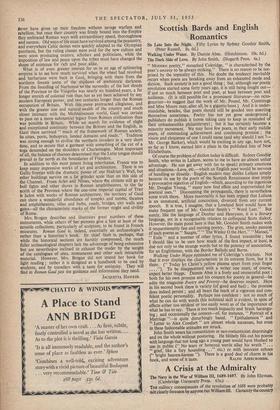Scottish Bards and English Romantics
So Late Into the Night. Fifty Lyrics by Sydney Goodsir Smith. (Peter Russell. 8s. 6d.)
" MODERN poetry," remarked Coleridge, " is characterised by the poet's anxiety to be always striking." There is no reason to be sur- prised by the topicality of this. No doubt the tendency inevitably recurs when poets are breaking away from an exhausted mode and diction. Such anxiety is not a good thing ; but, although our poetic revolution started some forty years ago, it is still being fought out— if not so much between poet and poet, at least between poet and audience. (It is still possible for a prominent littera/ow—no octo- genarian—to suggest that the work of Mr. Pound, Mr. Cummings and Miss Moore may, after all, be a gigantic hoax.) And it is under- standable, besides, that poets should still be goaded into asserting themselves sometimes. Poetry has not yet gone underground ; publishers do publish it (some taking care to keep us reminded of their unbusinesslike philanthropy) ; but it has certainly become a minority movement. We may have few poets, in their early middle years, of outstanding achievement and continuing promise ; the vision and eloquence of one I could name (and why should I not ?- Mr. George Barker), which would be exciting in any age, have not, so far as I know, earned him a place in the published lists of New Elizabethans.
Of course the problem of diction today is difficult. Sydney Goodsir Smith, who writes in Lallans, seems to me to have an almost unfair advantage. He can get away with (so to speak) primary emotions and situations—Love, etc.—which an English poet would be nervous of handling so directly. English readers may dislike Lallans simply because its use by the poets of the Scottish Renaissance does imply a provocative rejection of English—which, according to the ingenious Mr. Douglas Young, "many now find effete and impoverished for poetical uses." Discounting the propaganda, there is nevertheless some truth there. More reasonably it has been argued that Lallans is an unnatural, artificial concoction, divorced from any current speech. It is true, I imagine, that a Lowland Scot would have to make frequent use of Mr. Goodsir Smith's " Word Leet." But surely, like the language of Dunbar and Henryson, it is a literary language, yet in a recognisable relation to colloquial Scots dialect. However, the main point here is that Mr. Goodsir Smith makes with it unquestionably fine and moving poetry. The grim, smoky passion of such poems as" Saagin," " The Winter 0 the Hert," " Mansel," " Exile " and a number of other lyrics, I found irresistible ; but I should like to be sure how much of the first impact, at least, is due not only to the strange words but to the potency of association, for an Englishman, with the Border Ballads and Burns.
Walking Under Water reminded me of Coleridge's stricture. Not that it ever displays the characteristic in its extreme form, but it is there. (" Today let Christ's yellow plasma spurt from your finger ...."). To be disappointed with a writer one must, of course, expect better thipgs. Dannie Abse is a lively and resourceful poet : both for his own promise and his concern for poetry in general—he edits the magazine Poetry and Poverty—he deserves respect. Here in his second book there is variety (of good and bad) ; the promise does indeed persist ; and ali bears the mark of a vigorous and con- fident poetic personality. Perhaps too confident : not so much of what he can do with words (his technical skill is evident, in spite of effects either too strident or too easily won) as of the importance of
• what he has to say. There is too much loquacity and brash harangu- ing; and occasionally the content—of, for instance, " Portrait of a Marriage "—is quite disturbingly banal. " Epithalamion " and "Letter to Alex Comfort" are almost whole successes, but even in these fashionable attitudes are struck.
John Smith wears his romanticism or neo-romanticism disarmingly and on the whole without posturing. He blithely fills out his poems with language that not long ago a young poet would have blushed to use in public (" No tears or honeyed words allay his wrath"... " grief, like a fury hounding ..." etc.) or with innocent echoes (" bright heaven-havens "). There is a good deal of charm in his


































 Previous page
Previous page